- Home
- Elmore Leonard
Pagan Babies Page 11
Pagan Babies Read online
Page 11
Terry said, “Randy’s in the Mafia? If such an organization in anyone’s wildest imagination exists?”
“You got by in Africa,” Debbie said, “on Scotch and that smarty-innocent attitude, didn’t you? Like nothing really bothers you.” She said, “No, Randy’s not in the Mafia. But he has a silent partner, a guy who does exist and you’d better believe it, who is. Right at the top. Randy only acts like he’s in the mob. It’s his new thing. He even has a gangster for a bodyguard, a guy Ed says is called Mutt, or the Mutt. And do you know where Randy got his bodyguard? From Vincent Moraco.”
Terry said, “Oh.”
“Oh is right. When you were in the cigarette business didn’t you see a Mrs. Moraco to get paid?”
“Yeah, but I never believed she was Vincent Moraco’s wife. He’s an older guy and she was pretty young.”
“You knew Vincent?”
“I’d hear about him from Johnny, he had the connection.”
“Well, listen to this,” Debbie said. “I tried to get Bernacki to represent me on the assault thing? He would’ve got me off with time served, three months in the lovely Palm Beach County Stockade ’cause I couldn’t raise the bond. But Ed was busy with racketeering indictments. That was three years ago and they’ve finally come to trial, here in federal court—the Tony Twins, Anthony Amilia and the underboss Anthony Verona. They could get like twenty-five to life if convicted.”
“Those guys’ve been around forever.”
“Both in their seventies,” Debbie said. “There’re six defendants on trial, the Tonys and some other guys I’ve never heard of. But Verona has a heart condition and may not stand trial.”
Terry said, “I’m beginning to see where you’re going with this.”
“I thought you might,” Debbie said. “It turns out cigarette tax fraud is on the RICO indictment, going back five years.” She took a sip of vodka, giving herself a few beats before springing the punch line. “So then I wondered if they might call you as a witness.”
He said, “Testify against the mob in federal court.”
Looking at her with that quiet gaze.
She wanted to kiss him. “You’re a cool guy, Terr, even if you did see it coming.”
He said, “Witness for the Prosecution. That wasn’t a bad movie, Charles Laughton, Marlene Dietrich . . . But this sounds a little different. You told Bernacki I was in the cigarette business?”
“He asked what I was doing at the Frank Murphy. I told him and that’s when he told me cigarette tax fraud was on the indictment, going back to when you were involved.”
“He said I could be called?”
“Well, actually,” Debbie said, “I brought it up. I asked Ed if it was a possibility, and he said if you haven’t been subpoenaed by now the chances are you won’t be. Ed says the U.S. Attorney refuses to give him their witness list, afraid Ed’s clients might get to them. If you want, he’ll find out if you’re on the list.”
“You gave him my name?”
“No, I wanted to tell you about it first.”
“See if I’d panic?”
“I know you better than that.”
“But you’re not sure. What do you think I’d do if I was subpoenaed? Leave town?”
“I don’t know, would you?”
He kept looking at her in his quiet way, but didn’t say anything and she didn’t have a clue as to what he was thinking. She said, “I mentioned it so you’d know, that’s all, in case you are called. But the chances are you won’t be, so why don’t we forget it, okay? What we have to talk about is Randy’s situation. If he’s in tight with gangsters—and Ed says he’s starting to act like one—you might want to forget the whole thing. I wouldn’t blame you if you did.”
“You tell Bernacki what you’re up to?”
“Only that I want to get my money back.”
“What’d he say?”
“Forget about it. Write it off to experience.”
“Well?”
“You know I’m not gonna back off,” Debbie said, “whether you’re with me or not.” She watched Terry finish his drink and wipe the back of his hand across his mouth.
He said, “I decide to walk away, you’ll slip and fall all by yourself?”
“I’m not sure what I’ll do.”
“Have dinner there and get food poisoning?”
“That’s not bad.”
“Throw up on the table?”
They were playing again, back in business.
“Or, once a day walk in the door and throw up,” Debbie said, “till people stop coming and his business falls off. His restaurant business.”
“Or,” Terry said, “you try the direct approach, ask Randy to pay what he owes you.”
Debbie said, “Now why didn’t I think of that?”
“How much you make a year?”
“Why?”
“Come on, tell me.”
“Never less than fifty thousand.”
“That’s not bad, but let’s make it sixty-one thousand. Times three, that’s a hundred and eighty-three grand you didn’t make while you were locked up. Add that to the sixty-seven he ripped off, he owes you two hundred and fifty thousand. Can you slip and fall and win an award like that?”
“You figured that out in your head?”
“Stay with me. Can you win that much in court?”
“Not unless you break your back and you’ll never walk again. You could even get a lot more.”
“But two-fifty, does that sound about right, being realistic, something he can handle without too much trouble? We split it, you still get back almost twice what he scored off you.”
“But when we take this direct approach,” Debbie said, “and get thrown out on the street—”
“Okay, let’s say I do slip and fall in his restaurant, injure my back. We can begin by threatening him with a lawsuit. He says no to the two-fifty, we show him how he can write the entire amount off on his income tax.”
“Wait a minute—how?”
“By making the check out to the Little Orphans of Rwanda Fund, a charitable write-off.”
She watched him take a sip of beer, from the bottle. “You’ve been working this out, haven’t you?”
“It’s what priests do mainly, figure out how to raise money. Buy a new organ, repair the roof of the church—”
“He still won’t pay.”
“Maybe—”
“I know he won’t.”
“Let’s talk to him and see what happens.”
“He’ll sic the Mutt on us, that thug he’s got working for him.”
Terry said, “Now we’re getting to what I know something about.”
It scared her a little, the way he said it.
Later on Terry left in Fran’s car to pick up his suit. Debbie offered to take him, but he said he wanted to try the Lexus. He’d already tooled around in Mary Pat’s Cadillac and thought they’d take it downtown tomorrow night to see Randy. Terry said he liked to drive. Not having a license or knowing exactly where he was going didn’t seem to bother him. He said don’t worry, he’d find it, a giant mall on both sides of Big Beaver, right? Debbie told him it was called Somerset Collection, very upscale, Tiffany, Saks, Neiman Marcus, no Sears or JC Penney . . . He said right, and drove off. Confident.
No longer coming off as a simple soul. Confident in a very low-key way, not trying to be cool and yet he was.
Debbie went in the kitchen and took one of Mary Pat’s casseroles out of the freezer, in a hard-as-a-rock plastic bag, chicken delight neatly handprinted on the bag in green Magic Marker. Yeah, well, we’ll see. Debbie turned to place the casserole on the counter and saw the machete lying there. This morning they’d brought Johnny out to the kitchen for a cup of coffee, Johnny still holding the machete, playing around with it, swiping it in the air. Terry told him he was going to cut himself and he laid it down. They stood sipping coffee and talking, Terry telling about the piles of machetes you’d see, hundreds that were confiscated: in the kitchen
talking about the genocide the same way she and Terry had stood talking about it in her kitchen, last night. Terry telling about the guys, the Hutu thugs, in the beer lady’s house . . . No, get it right, in the words she told him she’d never forget.
They were sitting at a table in the beer lady’s house drinking banana beer and I shot them with my housekeeper’s pistol.
Sitting there. He said not giving them a chance to make a move. Just walked in and shot them? He said no, they exchanged a few words.
But I knew going in I was gonna kill them.
Telling her that in the same quiet way he had told her a little while ago:
Now we’re getting to what I know something about.
She thought about it making herself a drink while hot water from the faucet ran on the plastic-covered casserole in the sink.
It scared her, even though there was no reason to think he’d want to do it again. Or that he liked doing it. Or the time would come when he’d have to do it. What bothered her was the fact he had lived for years among people who had killed their neighbors because they were told to and the victims had accepted being killed. He had said to her, “How do you understand that . . .” Like saying it had nothing to do with reason. Why had he brought the machete home? He said as a memento. She told herself not to assume anything. She wasn’t even that sure what he meant by “getting to what I know something about.” It could mean talking his way out of a tight spot, the way he handled Johnny Pajonny, turning the situation around on him. Randy tries to get tough, Terry talks him out of doing anything drastic.
Except Randy wasn’t like Johnny.
And Terry . . .
She heard the garage door open, raising automatically on its tracks, then heard it closing as the door to the kitchen opened and Terry came in pulling his new black suit out of the Brooks Brothers hanging bag, held it up for her to see, proud of it—she could tell—and asked how she liked it.
. . . Terry wasn’t like anyone she’d ever met in her life.
“You have to admit, Mary Pat knows how to cook.”
“Casseroles,” Debbie said, “are easy. Throw a lot of stuff together and shove it in the oven.”
“How was the food inside?”
“For lunch, macaroni and cheese, cole slaw, rice pudding and three slices of plain bread. Everything looked alike.” She said, “You didn’t eat insects, anything like that, did you?”
“You only ate the ones flew in your mouth,” Terry said. “Listen, I’m gonna call Johnny, see if he wants to go with us tomorrow.”
Debbie said, “Why?” because there was no obvious reason to have him along.
All Terry said was, “I think he’d enjoy it.”
15
* * *
RANDY BECAME A GANGSTER ABOUT two months after opening the restaurant, still into a Pierce Brosnan phase, custom-tailored dark suits and a hint of Brit nonchalance in his speech. His response to problems, a minor fire in the kitchen: “Oh really? Why don’t you see Carlo about that?” Carlo his manager—maître d’ with thirty years in the business and a small percentage of the restaurant profit as incentive. Randy loved being Randy’s, always ready with car talk visiting tables, business trends he got out of Automotive News, motoring fun and gear ratios from Automobile. That part, for a world-class schemer, was easy. Being on his feet most of the day was the killer, but worth it. Randy’s had opened big and was the place to be.
Hour Detroit magazine said: “Filling the gap left by the old London Chop House—still mourned by those who feel fine dining should allow fine diners to be seen to their best advantage—Randy’s is clubby, polished and features a floor plan that encourages seating elitism. Booth No. One is back downtown and, not incidentally, in a place unrivaled for fabulous food, pricey booze and a wine list that’s the Yellow Pages.”
Randy had the review framed on the wall near the entrance. The rest of the walls were gathering caricatures of Detroit celebrities, most of them famous names who’d died or left town: Joe Louis, Gordie Howe, Lily Tomlin, Tom Selleck, Henry Ford II, Jeff Daniels, Iggy Pop . . . Carlo was responsible for refinements. The cigar room with its own bar. The personal lockers with nameplates for cognac and expensive whiskeys purchased by the bottle. Godiva mints in the dish by the entrance. Ice in the men’s room urinals, newspaper pages from the business and sports sections taped to the wall above each one. “So they can read while they piss,” Carlo said. “These are busy men dine here.”
Randy said, “But not in the women’s?”
“Women don’t read on the toilet,” Carlo said. “They have hair-spray on the sink and a colored woman helps them pin things that come undone.”
Randy’s change from sophisticated Brit to cool gangster began to take place on a Monday night about ten. (They were closed Sundays.) Randy was talking to his little maître d’ at the end of the bar near the entrance. Carlo glanced up and seemed momentarily startled, then looked aside as he said to Randy, “Be careful of this guy. Be nice to him.” Now Carlo raised his brow in pleasant expectation and stepped past Randy saying, “Mr. Moraco, is so good of you to come in. I believe only your first time, no? Shame on you.”
There were two of them. To Randy, a couple of guys off the street. But if he had to be careful—Carlo’s warnings always to be trusted—let’s see what we have here. A couple of mob guys? Quite possibly. The older one with sleepy eyes, dark suit and shirt, no tie but buttoned up all the way, steel-gray hair cut very short, this would be Mr. Moraco. Randy saw him as a dedicated soldier, but lacking the polish of an officer, more like a thirty-year noncom, though not a mob soldier, Moraco would be at least a capo. Betcha. The other guy was the soldier, about five eight, maybe thirty, one of those street tough guys in a bomber jacket and Banlon shirt, open. He could be a fighter, a pro boxer Moraco had brought along. The guy, though, did not look at all Italian.
Moraco said something as he came past Carlo looking straight ahead—thin nose, not a bad-looking guy, mid-fifties—and Randy stuck out his hand.
“Mr. Moraco—”
He took hold of Randy’s fingers, squeezed and let go, saying, “Mr. Agley, how you doing? I’m Vincent Moraco,” and stopped there, turning to look over the room. “Not bad for a Monday. I thought you had a trio.”
“Thursday through Saturday,” Randy said.
Vincent Moraco was nodding. “Good bar business. You have any girls come in?”
“Young ladies? Yes, of course. But it’s not a pickup bar, if that’s what you mean. We get quite a nice crowd every night, fortunate to have General Motors only a couple of blocks away, in the RenCen.”
“What I’m gonna do,” Vincent Moraco said, “is line you up with some high-class girls, dress nice, fit right in. They come in ten o’clock on, every night. Saturday guys’re here with their wives or girlfriends, so maybe only one will come in, make the guys from out-of-town happy. The girls have a drink at the bar, they’re seen and they leave. But not with a guy. Any guy comes up to them, they’re waiting for somebody, their husband. The guy keeps trying, becomes a problem”—Moraco half turned, his sleepy eyes moving to the soldier—“the Mutt here tells the guy in a nice way to get lost. The guy gets tough about it, the Mutt takes him outside.”
“The Mutt,” Randy said, “and you go by Vincent or is it Vinnie?”
“Stay with Vincent you’ll be okay. The Mutt’s also your bodyguard, so you pay him.”
“How much?”
“Five a week, cash.”
“I’m not sure I need a bodyguard.”
“You not sure ’cause you never know, that’s why you need one. What you do, let your good customers with house accounts know the girls are here. Maybe three or four will come in, but not at the same time, so it don’t look like a whorehouse.”
Randy glanced over to see Carlo watching, Carlo nodding toward Number One, called a booth but actually a banquette, and Randy said, “Why don’t we sit down and have a drink?” His first step in becoming a mob guy.
Moving to the
booth, Vincent Moraco motioned to the Mutt to join them. The waitress, in her tux, was there before they were all seated. “At Randy’s,” Randy said, “every waiter in the place is yours. Cindy here is my star. Cindy only takes care of this booth, Number One. She needs help she’s got it.”
Cindy took their orders and left.
Watching her go the Mutt spoke his first words, saying with a country accent that turned Randy’s head to look at him, “Man, she could sell pussy ‘long with the others, you know it?”
Randy had to ask him, “Where you from?”
“Indiana,” the Mutt said. “You know where Bedford’s at? On U.S. Fifty?”
Randy made a decision. He said, “Mutt, I don’t need a Hoosier hotshot fucking with my staff. You got it?”
The guy seemed surprised. Vincent Moraco said, “He knows his place.”
And Randy’s role was established. He was accepting the arrangement—since he didn’t see that he had a choice—but would remain the boss here. It was Randy’s second step approaching gangland.
“The way it works,” Vincent said, stirring his Canadian Club and Coke, “your good customers from GM, Ford’s, Compuware, call you over to the table. ‘Say, Randy, you happen to know that redhead sitting at the bar?’ You look over. ‘Oh, you mean Ginger? You like to meet her? She staying at the hotel ’round the corner.’ Then you say, ‘We have a special arrangement, you want to party over there with Ginger, I can put it on your tab, here.’ After that they know they don’t have to carry extra cash with them, it’s house-account pussy. The wife sees the bill, ‘Jesus Christ, you buying drinks for the fuckin house?’ What she don’t accuse the guy of is getting laid.”
“How much a trick?”
“Five.”
“They’re all the same?”
“Stand ’em on their heads . . . Yeah, all’re five a trick.”
“What about all night?”
“A grand, anything over an hour. The girls with baby-sitters get another two bills from the guy, over and above the tip.”

 Charlie Martz and Other Stories: The Unpublished Stories
Charlie Martz and Other Stories: The Unpublished Stories Elmore Leonard's Western Roundup #2
Elmore Leonard's Western Roundup #2 Fire in the Hole
Fire in the Hole Tishomingo Blues (2002)
Tishomingo Blues (2002) Djibouti
Djibouti When the Women Come Out to Dance: Stories
When the Women Come Out to Dance: Stories Riding the Rap
Riding the Rap Moment of Vengeance and Other Stories
Moment of Vengeance and Other Stories Raylan
Raylan Touch
Touch Mr Majestyk
Mr Majestyk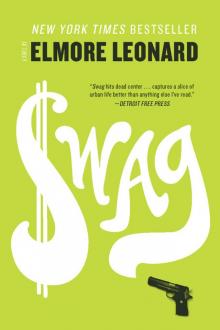 Swag
Swag Road Dogs
Road Dogs La Brava
La Brava The Hot Kid
The Hot Kid Valdez Is Coming: A Novel
Valdez Is Coming: A Novel Be Cool
Be Cool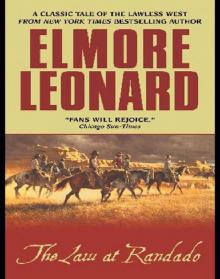 The Law at Randado
The Law at Randado The Bounty Hunters
The Bounty Hunters When the Women Come Out to Dance
When the Women Come Out to Dance 310 to Yuma and Other Stories (1953)
310 to Yuma and Other Stories (1953)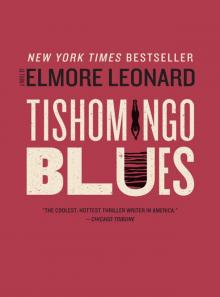 Tishomingo Blues
Tishomingo Blues Cat Chaser
Cat Chaser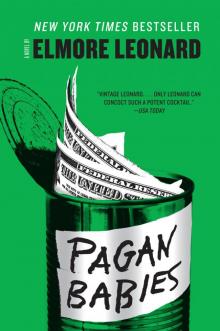 Pagan Babies
Pagan Babies Elmore Leonard's Western Roundup #1
Elmore Leonard's Western Roundup #1 52 Pickup
52 Pickup Stick
Stick The Moonshine War
The Moonshine War Valdez Is Coming
Valdez Is Coming City Primeval
City Primeval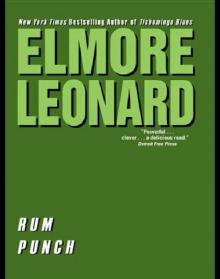 Rum Punch
Rum Punch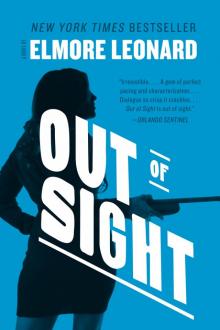 Out of Sight
Out of Sight Naked Came the Manatee (1996)
Naked Came the Manatee (1996) Killshot
Killshot Cuba Libre
Cuba Libre Forty Lashes Less One
Forty Lashes Less One The Complete Western Stories of Elmore Leonard
The Complete Western Stories of Elmore Leonard Pronto
Pronto Split Images
Split Images Last Stand at Saber River
Last Stand at Saber River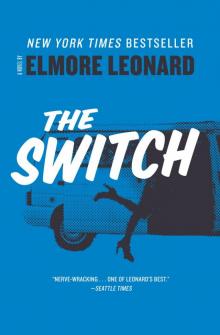 The Switch
The Switch Three-Ten to Yuma and Other Stories
Three-Ten to Yuma and Other Stories Bandits
Bandits Comfort to the Enemy and Other Carl Webster Stories
Comfort to the Enemy and Other Carl Webster Stories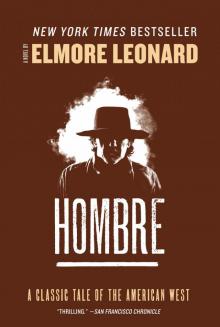 Hombre
Hombre Trail of the Apache and Other Stories
Trail of the Apache and Other Stories LaBrava
LaBrava Gold Coast
Gold Coast Jackie Brown
Jackie Brown Escape From Five Shadows
Escape From Five Shadows Karen Makes out (1996)
Karen Makes out (1996) Up in Honey's Room
Up in Honey's Room How Carlos Webster Changed His Name to Carl and Became a Famous Oklahoma Lawman (2003)
How Carlos Webster Changed His Name to Carl and Became a Famous Oklahoma Lawman (2003)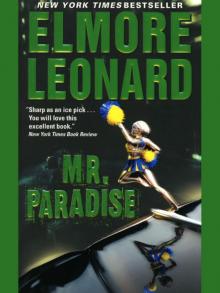 Mr. Paradise
Mr. Paradise The Hunted
The Hunted Freaky Deaky
Freaky Deaky Louly and Pretty Boy (Ss)
Louly and Pretty Boy (Ss) Glitz
Glitz A Coyote's in the House
A Coyote's in the House The Big Bounce jr-1
The Big Bounce jr-1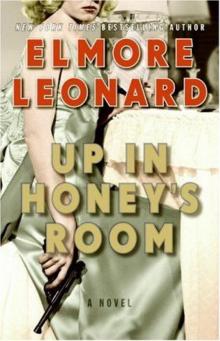 Up in Honey's Room cw-2
Up in Honey's Room cw-2 Unknown Man #89 jr-3
Unknown Man #89 jr-3 Get Shorty: A Novel cp-1
Get Shorty: A Novel cp-1 Gunsights
Gunsights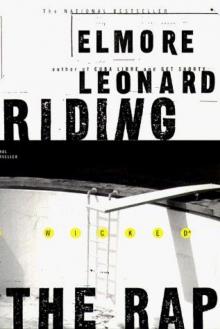 Riding the Rap rg-2
Riding the Rap rg-2